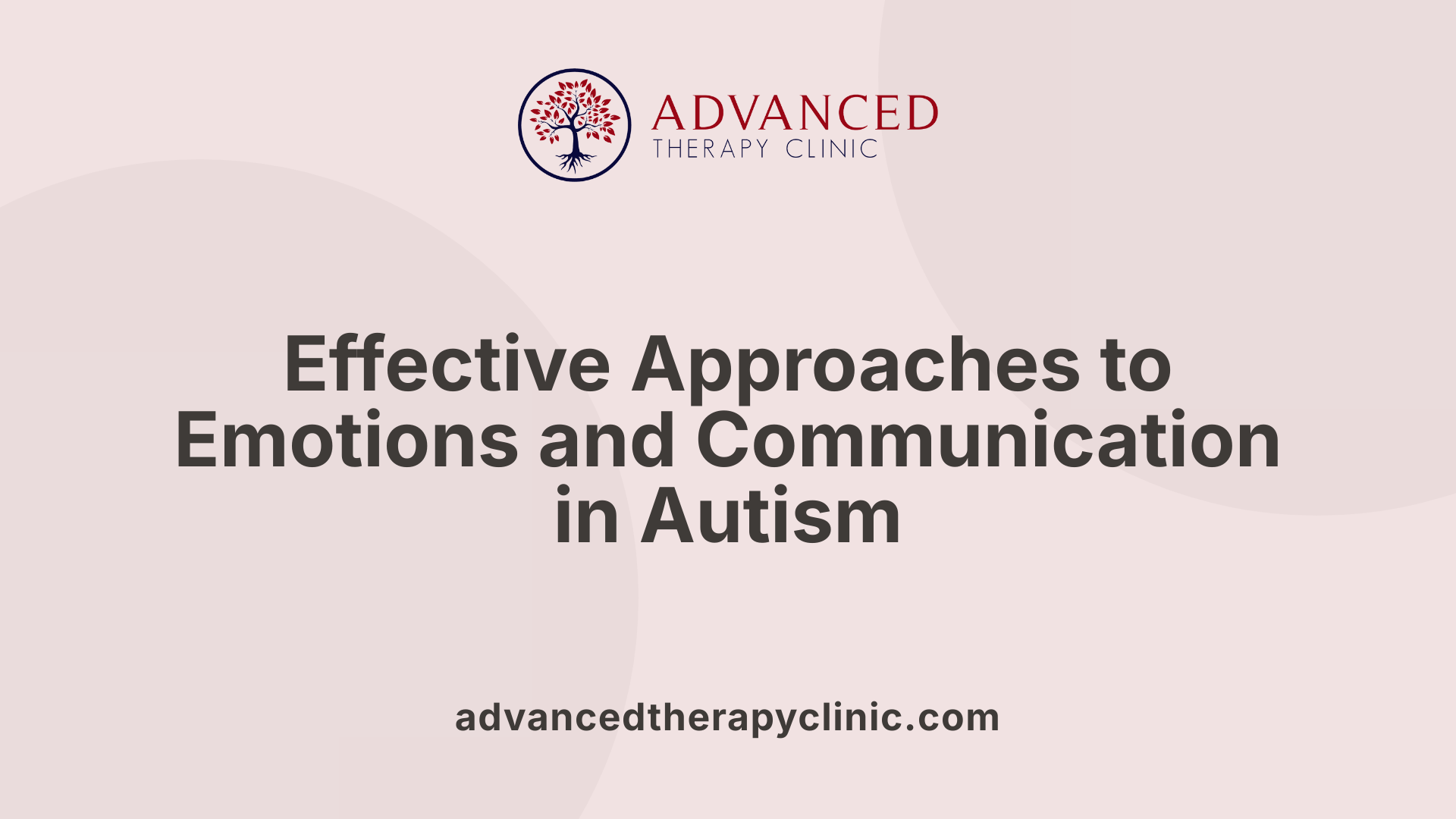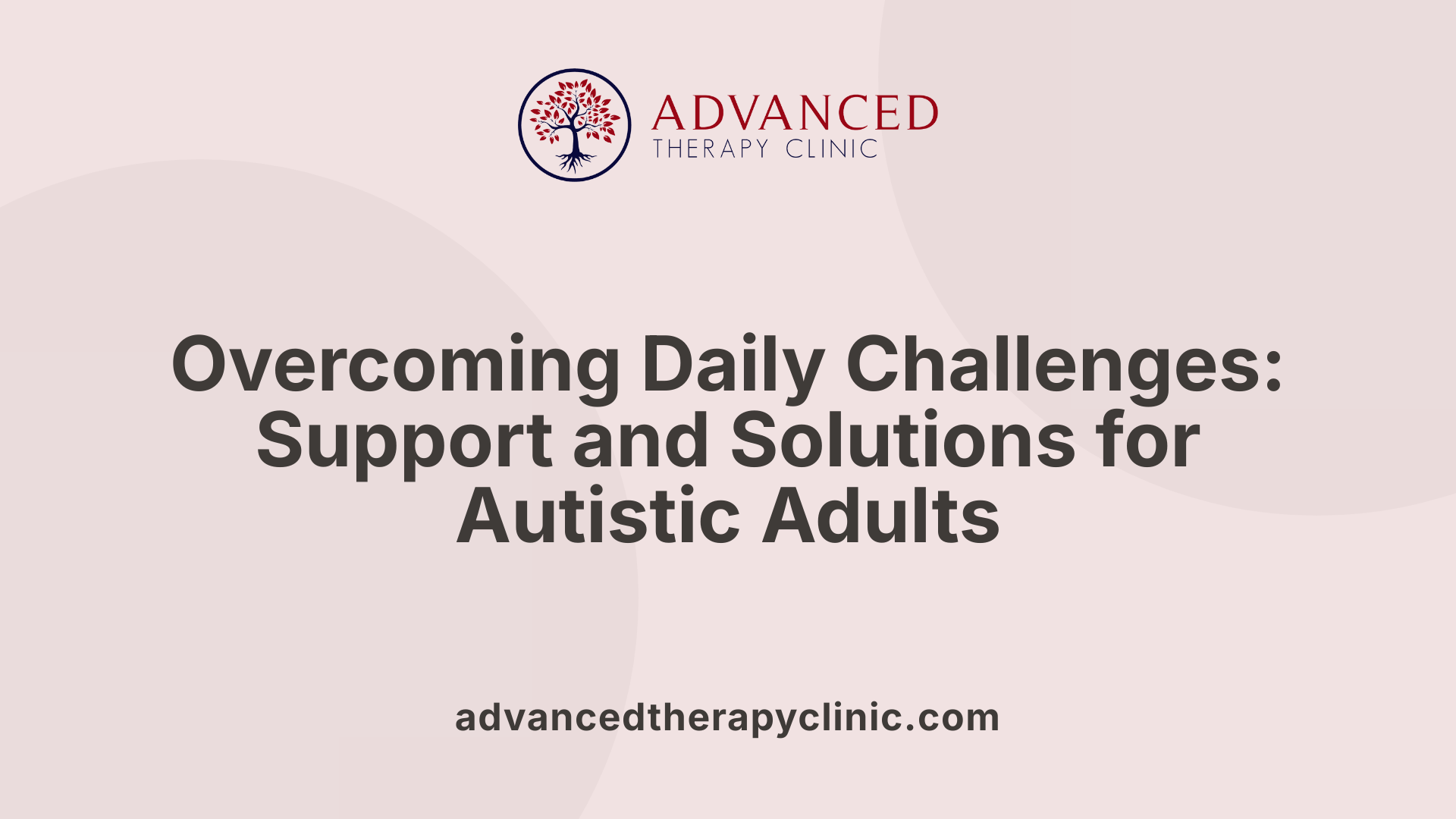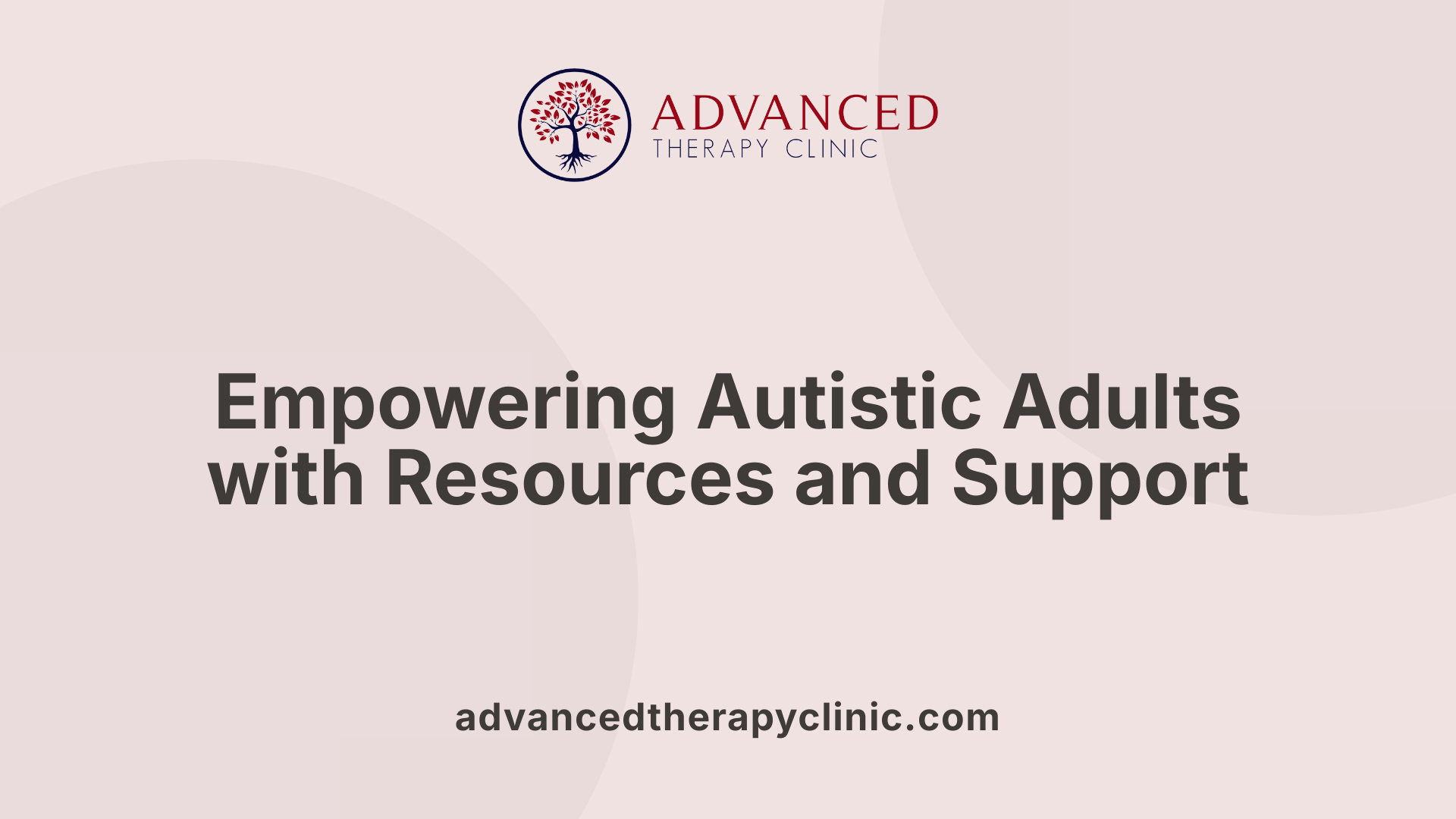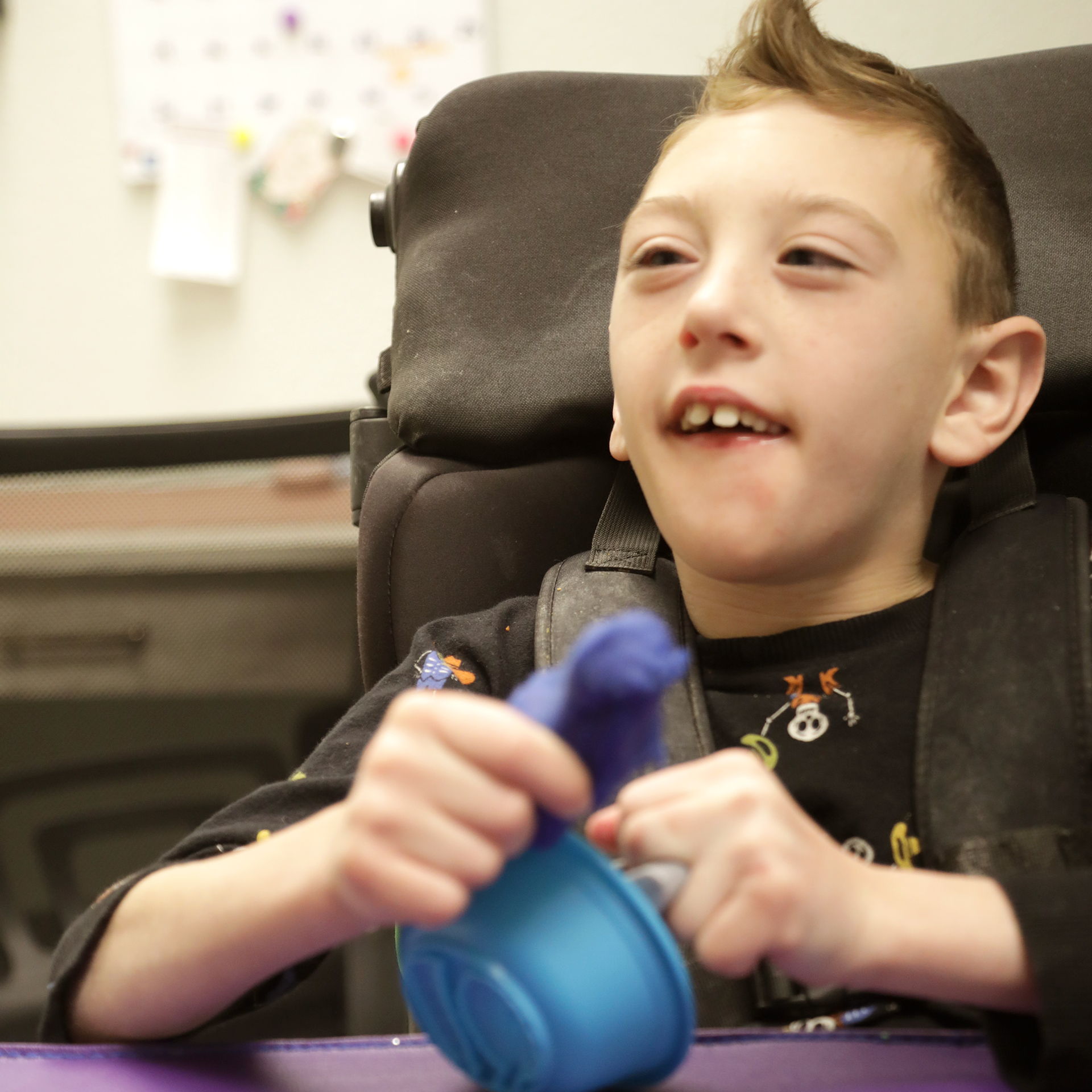How Autism Affects Daily Life Adults


An Insight Into Adult Autism and Its Impact
Autism Spectrum Disorder (ASD) is a lifelong neurodevelopmental condition that affects individuals’ communication, social interactions, behaviors, and sensory experiences. While much research has focused on childhood, growing awareness highlights the unique challenges faced by autistic adults. Understanding how autism influences daily routines, emotional regulation, social functioning, and overall quality of life is essential for providing appropriate support and fostering inclusion. This article explores the core characteristics, symptoms, and diagnostic criteria for autism in adults, as well as the practical implications on everyday activities and the strategies that can enhance independence and well-being.
Core Characteristics and Diagnosis of Autism in Adults

What are the common characteristics, symptoms, and diagnostic criteria for autism in adults?
Autism spectrum disorder (ASD) in adults presents with distinct social, behavioral, and sensory features. Adults with autism often struggle to interpret social cues, such as facial expressions, tone of voice, and body language. They may find it challenging to initiate or maintain conversations, understand sarcasm or figurative language, and navigate social norms.
Restricted and repetitive behaviors are also common. These can include adherence to routines, intense interests focused on specific topics, and sensory sensitivities—either hypersensitivity or hyposensitivity to stimuli like light, sound, or touch. Many adults experience difficulty with change, becoming distressed when routines are disrupted.
Social interaction is often affected, leading to feelings of awkwardness, loneliness, or social withdrawal. Some may prefer solitude or avoid eye contact and physical proximity. To cope with these challenges, many adults with autism mask or camouflages their symptoms, mimicking social behaviors to appear more typical. While this helps in social situations, it can be exhausting and may delay diagnosis.
The diagnosis process involves detailed clinical assessments that examine behavioral patterns, communication abilities, sensory issues, and personal history. Professionals such as psychologists, psychiatrists, or speech pathologists may use standardized tools and interviews to evaluate these traits.
Diagnosing autism in adulthood can be complicated due to variability in symptoms and masking behaviors, which sometimes hide core features. Recognizing these signs early can facilitate access to support, improving social interactions, mental health, and overall quality of life.
Search Query:
"Autism spectrum disorder in adults diagnosis signs symptoms"
Impact of Autism on Daily Living and Routines

How does autism affect various aspects of daily life in adults, including routines and challenges?
Autism plays a significant role in shaping the daily routines and overall independence of adults. Many autistic individuals rely heavily on structured routines and predictable environments to manage their day-to-day activities. Disruptions to these routines can cause heightened anxiety and distress, making it difficult to adapt to new schedules or unanticipated changes.
Communication difficulties are common, leading to challenges in social interactions and establishing relationships. Sensory processing differences, such as hypersensitivity to light, sound, or textures, can make environments overwhelming, further impacting daily functioning. Emotional regulation may also be affected, with some adults experiencing frustration, depression, or exhaustion — often linked to the continuous effort required to navigate social and sensory demands.
In addition to these challenges, many adults face co-occurring conditions like ADHD, epilepsy, or gastrointestinal issues, complicating health management and daily tasks. Barriers to employment and independent living restrict community participation, thereby reducing quality of life. Despite these hurdles, many adults develop coping strategies, supported by therapies, peer groups, and community services, which can help improve their engagement and reduce stress over time.
| Aspect of Daily Life | Common Challenges | Support Strategies |
|---|---|---|
| Routines and habits | Disruptions cause anxiety | Structured schedules, clear communication |
| Communication | Difficulties in understanding or expressing | Speech therapy, alternative communication methods |
| Sensory processing | Overload or under-responsiveness | Sensory accommodations, environmental adjustments |
| Independence | Limitations in daily tasks | Life skills training, assistive devices |
| Community participation | Reduced social engagement | Support groups, community programs |
Managing Emotions and Communication

How does autism influence an adult’s ability to manage daily routines, communicate effectively, and regulate emotions?
Autism can significantly impact an adult's capacity to handle daily routines, communicate, and regulate emotions. Many adults with ASD face difficulties with emotional regulation, which can manifest as rapid mood shifts, frustration, or withdrawal. They often experience heightened sensitivities to sensory stimuli such as loud noises or bright lights, which can exacerbate emotional overwhelm.
Communication styles among autistic adults can vary widely. Some may use alternative methods like sign language, gestures, or augmentative communication devices, while others may struggle with understanding figurative language, sarcasm, or social cues like facial expressions and body language. These challenges can lead to misunderstandings and feelings of social isolation.
Emotional regulation difficulties are connected to differences in sensory processing, interoception (which is the ability to sense internal body states), and neural pathways involving brain areas like the amygdala and prefrontal cortex. These intrinsic differences often make it hard for adults with autism to recognize, describe, and manage their emotions effectively.
Support strategies tailored to their needs include social and emotional skills training, counseling, and support groups. Techniques like mindfulness, sensory management, and self-soothing behaviors can help adults develop better coping mechanisms. Providing a supportive environment where their experiences are validated helps foster emotional well-being and social competence.
Challenges Faced in Daily Activities

Social interaction and understanding social cues
Autistic adults often have difficulty interpreting social cues such as facial expressions, body language, and tone of voice. This can lead to misunderstandings or unintentional social missteps, contributing to feelings of loneliness or social isolation. Many struggle to initiate or maintain conversations and may find it hard to develop or sustain friendships. As a result, social interactions can be stressful and exhausting.
Sensory sensitivities in public spaces
Many autistic individuals experience sensory processing differences, making certain environments overwhelming. Bright lights, loud noises, strong smells, or textured surfaces can cause sensory overload, leading to anxiety or distress. Public spaces like shopping centers, restaurants, or busy streets often exacerbate these sensitivities, affecting their ability to participate comfortably in everyday activities.
Executive functioning and daily organization
Executive functioning difficulties are common, impacting planning, organization, and time management. Tasks such as preparing meals, managing schedules, paying bills, or maintaining personal hygiene may require additional support. Disruptions to routines can trigger anxiety and meltdowns, making independence more challenging.
Mental health issues and social stigma
High rates of mental health challenges like anxiety, depression, and autistic burnout affect many adults with autism. The stress of navigating a world not always accommodating to their needs, coupled with societal stigma and misconceptions, can worsen these issues. Masking autistic traits to fit in is often exhausting and linked to poorer mental health, further complicating daily life.
| Challenge Area | Impact | Support Strategies |
|---|---|---|
| Social interactions | Misunderstanding emotions, social isolation | Social skills training, therapy, support groups |
| Sensory sensitivities | Overload in public spaces, distress | Sensory-friendly environments, noise-canceling devices |
| Executive functioning | Difficulties with planning, routines, and organization | Assistive tools, routines, coaching |
| Mental health and stigma | Anxiety, depression, burnout, social exclusion | Mental health support, anti-stigma campaigns, community support |
Understanding these challenges highlights the importance of tailored support and accommodations. Creating a more inclusive environment can significantly enhance the quality of life for autistic adults and help them develop functional independence.
Support Strategies and Resources for Autistic Adults

What resources, interventions, and strategies are available to support autistic adults in improving their daily living skills?
Supporting autistic adults in enhancing their daily living abilities involves a variety of personalized tools and services. Tailored therapies such as behavioral interventions, social skills training, occupational therapy, and communication support are fundamental. These interventions aim to promote independence, safety, and respect for individual preferences.
Community participation and employment support programs play a vital role. Employment training, supported work environments, and community engagement initiatives help adults develop skills and confidence. Organizations providing employment support networks, housing resources, and self-advocacy tools are empowering autistic adults to live more autonomous lives.
Accessible resources are also crucial. Easy-to-understand materials, community guides, and online platforms enable adult individuals to navigate healthcare, housing, legal rights, and social services more effectively. Creating autism-friendly environments within healthcare clinics, community centers, and workplaces ensures greater inclusion and less stress.
Support from professionals such as family support clinicians, patient navigators, and through telehealth options enhances access to necessary services. Overall, combining custom interventions, community supports, and accessible resources helps autistic adults achieve greater independence and improved quality of life.
| Support Type | Description | Example Resources/Strategies |
|---|---|---|
| Therapies and Interventions | Personalized therapies to develop daily living skills | Behavioral therapy, social skills training |
| Community and Employment Support | Programs to facilitate work and social engagement | Supported employment, self-advocacy tools |
| Accessible Environments | Creating inclusive settings for healthcare and community | Autism-knowledgeable staff, adaptive tools |
| Legal and Advocacy Resources | Rights and protections for adults with autism | Disability rights organizations, legal aid |
Research and community involvement continue to grow, offering more tailored options for autistic adults seeking to lead fulfilled and independent lives.
The Role of Research and Scientific Insights
 Current research on autism in adults reveals that the condition greatly influences daily living and overall quality of life. These effects span various areas, including physical health, emotional stability, social engagement, and environmental experiences. Many autistic adults report a lower quality of life compared to non-autistic individuals, with some of the foremost factors being the severity of autism symptoms, co-existing mental health issues like anxiety or depression, sensory sensitivities, and societal barriers.
Current research on autism in adults reveals that the condition greatly influences daily living and overall quality of life. These effects span various areas, including physical health, emotional stability, social engagement, and environmental experiences. Many autistic adults report a lower quality of life compared to non-autistic individuals, with some of the foremost factors being the severity of autism symptoms, co-existing mental health issues like anxiety or depression, sensory sensitivities, and societal barriers.
Research underscores that support systems such as stable employment, strong family ties, supportive relationships, and societal acceptance significantly enhance life satisfaction. Conversely, systemic obstacles like complex administrative procedures, employment discrimination, and social stigma diminish opportunities and well-being.
Studies also indicate that younger adults with autism tend to experience better psychological health and access to supportive environments, which can influence overall life satisfaction positively. Moreover, gender differences have been observed, with variations in physical comfort and social experiences playing a role in individual outcomes.
Overall, ongoing investigations emphasize the importance of understanding personal experiences and addressing societal and systemic barriers. Enhancing support services, increasing awareness, and promoting inclusive policies are essential strategies to improve daily functioning, mental health, and life quality for autistic adults.
Addressing Autism-Related Burnout and Improving Well-Being

What is autistic burnout and how can it be managed?
Autistic burnout is a state of physical, emotional, and mental exhaustion that many autistic adults experience due to ongoing stress, sensory overload, social challenges, and life transitions. It often presents as persistent fatigue, heightened sensitivity to lights, sounds, and touch, a decline in daily functioning, and feelings of frustration or overwhelm.
Burnout can be triggered by trying to meet societal expectations, masking autistic traits, or managing co-occurring conditions like anxiety or depression. Recognizing early symptoms such as increased irritability, difficulty concentrating, or a sudden loss of tolerance for stimuli allows for timely intervention.
Effective management strategies include practicing sensory regulation techniques like grounding exercises, taking regular breaks, and maintaining predictable routines that provide stability. Prioritizing self-care through adequate rest, balanced nutrition, and emotional support is essential.
Seeking help from mental health professionals with experience in autism care can provide tailored support and coping mechanisms. Creating supportive environments that acknowledge sensory sensitivities and social difficulties also plays a role in reducing burnout.
Community acceptance and societal understanding are vital. Reducing stigma helps alleviate the pressure to mask behaviors constantly and encourages autistic adults to seek help without fear of judgment. This fosters resilience and promotes well-being.
In summary, managing autistic burnout involves a combination of self-awareness, environmental adjustments, professional support, and societal acceptance, all aimed at improving quality of life and sustaining health over time.
Toward Greater Understanding and Support
While autism presents unique challenges throughout adult life, targeted support, community inclusion, and ongoing research can significantly improve the quality of life for autistic adults. Recognizing their strengths and addressing systemic barriers is essential for fostering independence, emotional well-being, and social participation. A comprehensive understanding coupled with compassionate policies and practices enables autistic adults to live fulfilling, autonomous lives—validated, supported, and included in society.
References
- Living with Autism Spectrum Disorder
- Autism and adults
- What is autism
- Challenges autistic people face
- How Autism Affects Daily Life - IBH
- How to navigate adulthood on the autism spectrum
- Exploring life with autism: Quality of Life, daily functioning ...
- What is autism?
- Challenges autistic people face
Recent articles

Celebrating Small Wins: How Therapy Helps Kids Build Confidence All Year Long
Learn why small wins in therapy matter, how they boost your child’s confidence, and simple ways families can celebrate progress all year long.

Empowering Missoula Children to Grow With Confidence and Connection
Learn how ABA therapy in Missoula helps children build communication, independence, and confidence through personalized, family‑centered support at Advanced Therapy Clinic.

Compassionate Pediatric Therapy in Butte, Montana
A welcoming place where every child’s potential is celebrated

How Pediatric Therapy Helps Kids Thrive across Montana and Wyoming
A supportive guide for families exploring therapy options in Billings, Butte, Missoula or Sheridan.

How to Choose the Right Pediatric Therapy Clinic in Billings, Montana
A Parent‑Friendly Guide To Finding The Best Support For Your Child

Expressive Speech Delay 2-Year-Old
Understanding and Addressing Expressive Speech Delay in Toddlers

